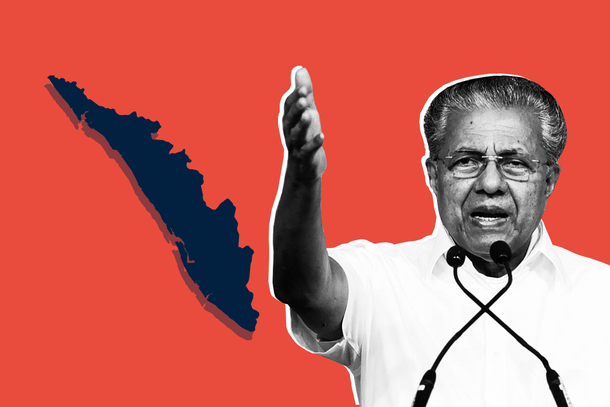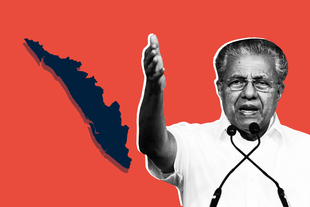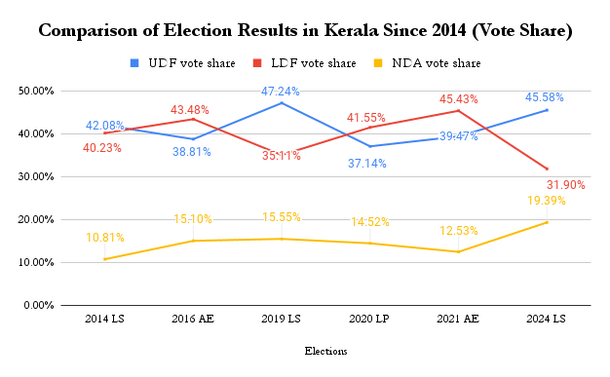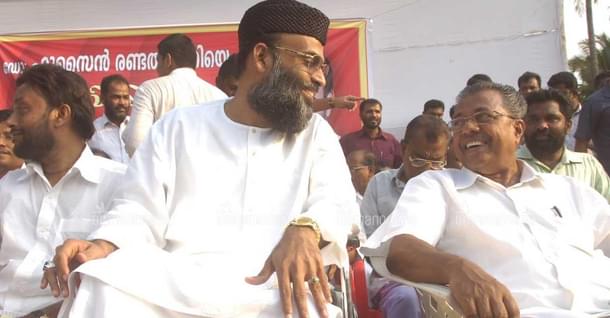Politics
CPI(M) Has Hit A Hard Cap On Minority Appeasement In Kerala
Ananth Krishna S
Jul 16, 2024, 01:06 PM | Updated 01:04 PM IST
Save & read from anywhere!
Bookmark stories for easy access on any device or the Swarajya app.


The biggest loser in the 2024 general election in Kerala is the Communist Party of India (Marxist), or CPI(M).
While the Bharatiya Janata Party (BJP) won a historic first seat in Thrissur and the United Democratic Front (UDF) maintained its upper hand, the CPI(M), like in 2019, managed to win just a single seat and its vote share fell to a historic low of 31.90 per cent.
Having created history by winning a second term in 2021 with as many as 99 out of 140 seats in the state assembly, the CPI(M) would be hoping that the Lok Sabha results are just a bump on the road to the 2026 assembly election.
Yet, the Lok Sabha election results have thrown up worrying signs for the party. It has started to lose votes in its ‘red forts’ to the BJP, and the attempt to encroach into the minority vote of the Congress-Indian Union Muslim League (IUML) combine has not paid dividends.
How It's Different From 2024
At a first glance, it might appear that the 2024 election results are just a rehash of the 2019 election results for the CPI(M), as the Left Democratic Front (LDF), which it leads, does not have a compelling narrative to offer at the national level.
However, upon a closer look at the factors that determined the 2019 versus 2024 elections, it becomes quite clear that 2024 is indicative of serious problems for the CPI(M).

After the Supreme Court judgement on the entry of young women into the Sabarimala temple in September 2018, Chief Minister Pinarayi Vijayan’s obstinate handling of the issue in support of the judgement sent ripples through Kerala society. The after-effects of that social churn is still playing out.
This factor, combined with the minority vote consolidating behind Rahul Gandhi because of his contesting from Amethi and the expectation that he will become prime minister, led to a historic low for the LDF in 2019.
It experienced a near-total washout in the election, being able to win only Alappuzha and securing only 35 per cent of the vote. This predicament was, however, temporary, as the welfare measures of the LDF government during the Covid-19 pandemic, as well as the perennial infighting in the Congress party, ensured a complete reversal in the 2021 assembly election.
However, the 2024 Lok Sabha election was not a repeat of 2019. There were no emotional issues tugging at the hearts of believers, nor was there a Rahul Gandhi ‘wave’. The unsaid consensus was that Prime Minister Narendra Modi would come back to power; so, voting for the Congress was not a particularly attractive proposition for the Malayali voter.
Moreover, the CPI(M) had made apparent inroads into the well-established minority vote banks in 2021.
Yet, the LDF was again limited to one seat (Alathur), and its overall vote share dipped even further to a mere 31.9 per cent, a dip of 3 percentage points from their then-worst performance of 35.11 per cent. What gives?
Social Coalition Fraying At The Edges
The CPI(M) and LDF have attempted to build a broader social coalition by attracting the votes of the conservative sections of both Muslims and Christians that had long been the primary base of the Congress-led UDF.
Over the years, the CPI(M) has tried to build traction among the Muslim community by encouraging the radical elements in the community that emerged in the aftermath of the Ram Janmabhoomi movement, such as Abdul Nazir Maudany.
These radical elements were not happy with the more moderate approach that the political leadership of the Thangal family provided.
This approach by the CPI(M) did not yield much initially, but the upset win of K T Jaleel (who is now emblematic of CPI(M)’s approach to the community) against IUML’s top man, Kunhalikutty, in 2006 indicated that the approach was not without merit.
The real swing to this approach came after Vijayan became Chief Minister. A machine politician who only acquired a ‘mass’ image due to his electoral success, Vijayan had nurtured a relationship with Maudany as state secretary.

This swing was further deepened by Vijayan, who was acutely aware of the shifts in demography in Malabar. The CPI(M) had long been meaning to cast a wider social coalition and deepen its relationship with the Muslim community. (Its tete-a-tete with the IUML in the 1990s, which ultimately led to M K Raghavan’s expulsion, is a tale for another day.)
Suffice to say that the CPI(M) has attempted to make inroads into Muslim votes from the AIML (opposition) to the still-alive Indian National League (INL), outfits composed of IUML dissidents.
Vijayan expanded on the CPI(M)’s well-established strategy of promoting IUML rebels within the LDF. Jaleel, dubbed the ‘Sultan Of Malappuram’, was the chief minister’s weapon of choice to break into the forts of the IUML.
Jaleel had been associated with the banned Students Islamic Movement of India (SIMI) in his youth, before joining the IUML. He was thrown out of the league in 2005 following a run-in with Kunhalikutty, and he took a sweet revenge on him by delivering Kunhalikkuty’s only electoral defeat in 2006.
Jaleel is a noted orator and an academic who wrote a thesis on the Mappila Rebellion of 1923. Jaleel is not a member of the CPI(M), but he is the symbol of CPI(M)’s outreach to the community. And he has been a vocal proponent of the community’s interest within the first Vijayan ministry.
Jaleel came under the cloud for being a witness in the gold smuggling case and an accused in a related but separate case relating to the violation of the Foreign Contribution (Regulation) Act (FCRA). He was ultimately forced to resign over a nepotistic appointment he made. Though Jaleel has not found space in the second Pinarayi ministry, he remains a confidante of the Chief Minister.
Parallel to its attempts to expand into Muslim vote banks, the CP(I)M also sought to expand its linkages and connections with the churches.
Journalist Veena George contested in 2016 in Aranmula, supposedly on the recommendation of the Jacobite church that had a significant presence in the region.
This strategy of getting covert support from the church was evident even in the 2022 Thrikkakara bypoll, where Dr Jo Joseph was the LDF candidate. Joseph, too, was alleged to be the ‘nominee’ of the Catholic church, which has substantial influence in Thrikkakara. While George succeeded in 2016 and 2021, and is now a minister, Joseph failed to win in the bypoll.
The real shot in the arm for the LDF came after Kerala Congress (Mani) split into two (again) following the death of K M Mani.
Mani’s son, Jose K Mani, joined the LDF before the 2021 assembly election. Though Jose failed to win in his father’s constituency of Pala, at least a section of the Christian vote polled for the LDF. The wider trends within the Christian community and the church against Islamic exceptionalism had no doubt contributed to the switch.
That this is a consideration is evident from the fact that the minority ministry that had been under a shadow of doubt under Jaleel in the first Pinarayi cabinet is directly held by the chief minister himself in the current ministry.
The social coalition that CPI(M) had been able to build by 2021 delivered its best-ever result by winning 99 seats out of 140. Halfway through the term, it looks like the CPI(M) has not only lost the new entrants in its coalition, but also its base of ‘Hindu’ votes seems to have voted for the BJP.
Narratives That Failed CPI(M)
In the 2024 general election, the CPI(M) attempted to craft deeper inroads into the league-Congress votes. To this end, they fielded a league rebel in Ponnani, and the tallest Muslim leader within the CPI(M), Elamaram Kareem, in Kozhikode.
The narrative that CPI(M) attempted to present was that those elected on Congress tickets would switch to the BJP, and that the Congress had not taken a stance against the Citizenship Amendment Act (CAA), highlighting that it was not mentioned in their manifesto.
The party had gone into overdrive on the CAA, spreading more than a few disingenuous narratives on the issue.
Malayalam social media was abuzz about how the ‘lLDF’ is the reason for ‘India’ to exist. The pun linking the broader ‘INDI’ Alliance with the LDF’s strong presence within the coalition implied that the LDF was the only real ‘shield’ against the Hindutva politics of the BJP.
The Chief Minister’s speeches highlighted his strong opposition to CAA as a mark of credibility in dealing with the Modi government’s ‘anti-minority’ policies.
The second prong of this strategy was to court Muslim organisations and get their covert support. The CPI(M) wooed the ‘EK Faction’ of Samastha, the largest organisation of Muslim clerics in Kerala. The Samastha had deep and abiding connections with the league.
But with the league out of power in the state and Centre, Samastha had moved closer to the CPI(M). The CPI(M), in fact, counted on the organisation’s support in northern Kerala.
All of this made no difference to the voting patterns, as ultimately the CPI(M) got blown out of the water in both Kozhikode or Malappuram. In Vadakara, where the popular former health minister K K Shailaja faced off against the Congress’s Muslim face, Shafi Parambil, CPI(M) lost by more than 1 lakh votes compared to 85,000 in 2019.
In the Muslim-dominant constituencies of Malappuram and Ponnani, the league crossed its own stupendous margins from 2019.
The broader approach of the CPI(M) to consolidate Muslim votes in general elections have failed miserably.
Will 2026 Be Any Different?
The failure of the CPI(M) strategy to woo minority votes can be attributed to the lack of a national narrative or rationale, as they have historically underperformed in parliamentary elections compared to the assembly or local elections.
The precipitous decline in its vote share to 31.9 per cent is not a healthy sign. That the LDF won a single seat and led only in 19 assembly constituencies while the National Democratic Alliance (NDA) led in 11 is another indication (the UDF led in the rest 110).
While the stupendous anti-incumbency and misgovernance of the second Vijayan government are no doubt to blame for this poor performance, its minority vote bank also seems to have deserted it. There is a need for recalibration.
In the aftermath of the Lok Sabha results, while criticism of the Chief Minister and his government has risen from within the party’s ranks and the front, there are also some signs of a recalibration from the CPI(M) on minority vote banks.
Kerala state CPI(M) secretary remarked last week that the one-sided consolidation of Muslim votes in Malabar will have ‘profound consequences’. The remarks came in a speech that also called for Hindu temples and places of worship to be ‘administered’ by the community, excluding ‘communalists’ such as the Rashtriya Swayamsevak Sangh.
The CPI(M) seems to have hit a hard cap on its minority appeasement. How it will recalibrate is yet to be seen.





